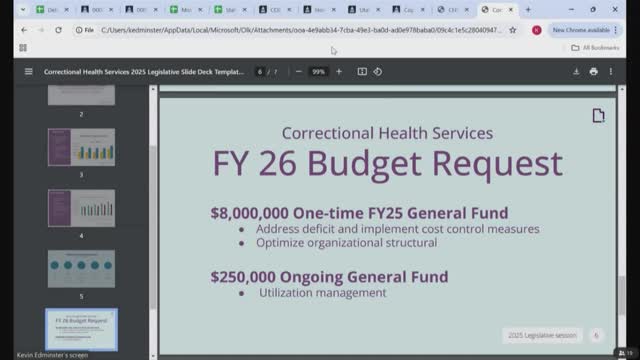DHHS and DCFS present multiple funding requests including foster‑care supports, Baby Watch and legal funding
Get AI-powered insights, summaries, and transcripts
Subscribe
Summary
Department of Health and Human Services and the Division of Child and Family Services presented a set of funding requests to the Social Services Appropriations Subcommittee on Jan. 30 that would fund foster‑care recruitment and retention, stabilize emergency placements, cover a legal funding gap, add trainer‑coaches for caseworkers and sustain Baby Watch early‑intervention services.
The Department of Health and Human Services and the Division of Child and Family Services (DCFS) presented multiple funding requests to the Social Services Appropriations Subcommittee on Jan. 30, asking lawmakers to fund programs that DCFS officials said would stabilize foster placements, strengthen caseworker support and preserve early‑intervention services.
DCFS requested roughly $5 million for foster‑care and kinship investments, officials said. The package is multicomponent: about $1.8 million would increase the contract with Utah Foster Care to support recruitment and retention, and other funds would increase foster care reimbursement rates, support First Lady Cox’s Care Communities program and roll out Family Action Meetings statewide, DCFS staff said. DCFS described the Family Action Meeting pilot as an early engagement model now in half the state that brings kin and supports together at case outset.
"Our goal is to retain experienced employees, enhance clinical support and improve child‑to‑staff ratios," a DCFS presenter said when describing an $885,000 request to stabilize two of three Christmas Box Houses, the short‑term emergency placements for children in foster care.
DCFS also requested $493,000 ongoing for five trainer‑coaching positions — one regional coach per DCFS region — to provide hands‑on mentoring for new caseworkers, including ride‑along home visits, facilitation of child and family team meetings and case reviews. DCFS told the committee turnover has fallen from a high near 40% but remains about 28%, requiring continued investment in workforce development.
The Office of Attorney General’s Child Protection Division requested funding to cover a shortfall in legal support for foster care, protective supervision and child protective services work. Taylor Kaufman, director of the Office of Budget for the Department of Health and Human Services, told the committee that a prior assumption about available federal funds did not materialize and that the state must cover a funding gap; the DCFS request included $715,000 that combined one‑time and ongoing amounts to address that deficit.
On a narrower item, the department requested $105,000 ongoing to ensure compliance with 2024 House Bill 38 by paying standard Medicaid rates for behavioral health outpatient services for children who receive services but are not Medicaid eligible.
For early childhood services, the Baby Watch Early Intervention program asked for $1.5 million ongoing to sustain current service intensity after the program reported a 42% increase in children requiring state funding over the last four years, staff said. Noelle, the division director for family health, said Baby Watch served about 15,715 children in 2024 through 14 local programs statewide and that the requested funds would preserve current visits per child without growth.
Committee members asked for clarifications about implementation and metrics. Chair Ward asked for the DCFS requests to be itemized on committee sheets so members could see the discrete parts of the larger $5 million foster‑care package. A committee member expressed concern that recruitment funds should be paired with process improvements to ensure applicants can be licensed and onboarded efficiently.
Committee staff did not record a final committee vote on the DCFS funding requests during the portion of the transcript captured; several other procedural motions on the agenda were approved earlier in the hearing. The subcommittee set public comment dates for upcoming meetings and adjourned at the end of the session.
